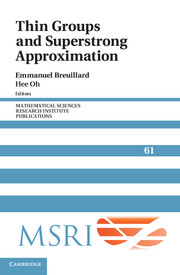Book contents
- Frontmatter
- Contents
- Preface
- Some Diophantine applications of the theory of group expansion
- A brief introduction to approximate groups
- Superstrong approximation for monodromy groups
- The ubiquity of thin groups
- The orbital circle method
- Sieves in discrete groups, especially sparse
- How random are word maps?
- Constructing thin groups
- Ergodic properties of the Burger–Roblin measure
- Harmonic analysis, ergodic theory and counting for thin groups
- Generic elements in Zariski-dense subgroups and isospectral locally symmetric spaces
- Growth in linear groups
- Strong approximation for algebraic groups
- Generic phenomena in groups: some answers and many questions
- Affine sieve and expanders
- Notes on thin matrix groups
Constructing thin groups
Published online by Cambridge University Press: 29 May 2025
- Frontmatter
- Contents
- Preface
- Some Diophantine applications of the theory of group expansion
- A brief introduction to approximate groups
- Superstrong approximation for monodromy groups
- The ubiquity of thin groups
- The orbital circle method
- Sieves in discrete groups, especially sparse
- How random are word maps?
- Constructing thin groups
- Ergodic properties of the Burger–Roblin measure
- Harmonic analysis, ergodic theory and counting for thin groups
- Generic elements in Zariski-dense subgroups and isospectral locally symmetric spaces
- Growth in linear groups
- Strong approximation for algebraic groups
- Generic phenomena in groups: some answers and many questions
- Affine sieve and expanders
- Notes on thin matrix groups
Summary
Let G be a semisimple Lie group and Γ < G a lattice. Following Sarnak [25], a subgroup Δ of Γ is called thin ifhas infinite index in , but is Zariski dense. Since it is straightforward to exhibit free subgroups of lattices that are Zariski dense, we shall, in addition insist that a thin group Δ is finitely generated and does not decompose as a free product.
There has been a good deal of interest recently in thin groups. This has been motivated in part by work on expanders, and in particular the so-called affine sieve of Bourgain, Gamburd and Sarnak [5]. Other recent work that study thin groups can be found in [13; 14; 15]. We also refer the reader to other papers in this volume.
The aim of this article is to summarize work in [22; 20; 21], as well as discussing some other results regarding (sometimes conjectural) constructions of thin subgroups in lattices.
We begin by outlining our strategy for generating some thin subgroups. We do this first in broad terms, and then specialize to some cases that we describe in more detail. In the remainder of this section, Γ will denote a Fuchsian group (i.e., a discrete subgroup of PSL(2,ℝ)) or a Kleinian group (i.e., a discrete subgroup of PSL(2, ℂ)) of finite covolume, and G a semisimple Lie group not locally isomorphic to PSL(2,ℝ) or PSL(2;ℂ).
Information
- Type
- Chapter
- Information
- Thin Groups and Superstrong Approximation , pp. 151 - 166Publisher: Cambridge University PressPrint publication year: 2014
